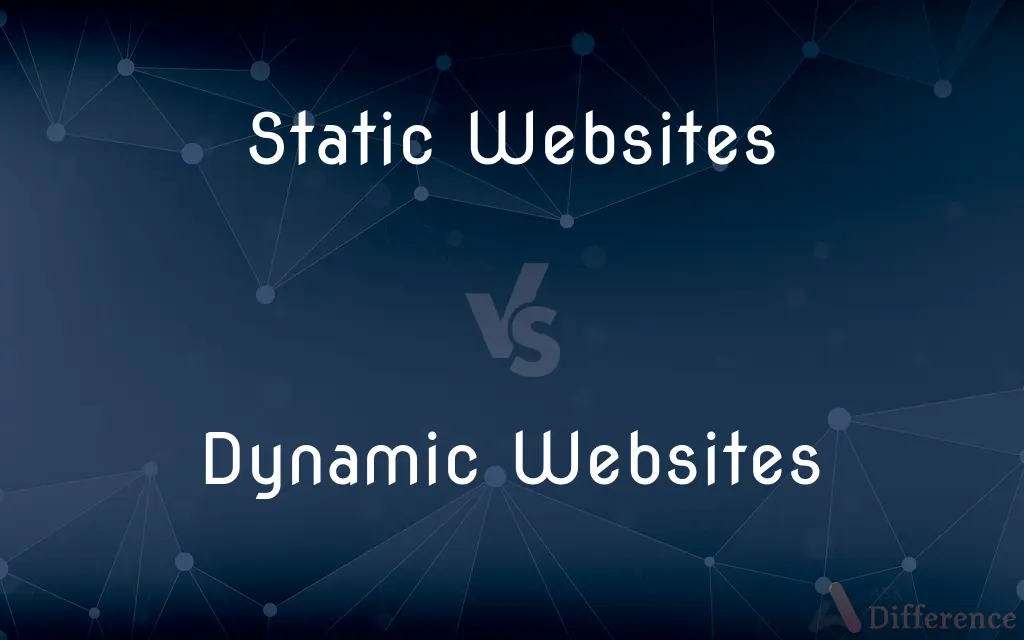Static Websites vs. Dynamic Websites — What's the Difference?
By Tayyaba Rehman & Urooj Arif — Published on October 21, 2024
Static websites deliver the same content to every visitor without server-side processing, whereas dynamic websites generate customized content for users through server-side scripting.

Difference Between Static Websites and Dynamic Websites
Table of Contents
ADVERTISEMENT
Key Differences
Static websites consist of fixed content, where each page is coded in HTML and displays the same information to every visitor. These websites are straightforward to create and host, making them ideal for simple, informational sites. On the other hand, dynamic websites use server-side languages like PHP, JavaScript, or ASP.NET to generate content in real-time, allowing for personalized user experiences, such as user accounts and e-commerce functionalities.
While static websites are faster to load due to their simplicity and lack of database queries or server-side processing, dynamic websites offer enhanced interactivity and flexibility, adapting content based on user interactions or data. This makes dynamic sites suitable for complex applications like online stores or social networks.
The development and maintenance of static websites are relatively less resource-intensive compared to dynamic websites. Static sites require basic HTML and CSS knowledge, whereas dynamic sites involve understanding server-side programming and database management, making the latter more complex and costly to develop and maintain.
Security is another differentiating factor; static websites are generally more secure since they don't interact with databases or execute server-side scripts, reducing vulnerability points. Dynamic websites, by contrast, must implement stringent security measures to protect against attacks like SQL injection or cross-site scripting (XSS).
Despite these differences, the distinction between static and dynamic websites is becoming blurred with the advent of technologies like serverless architectures and static site generators. These allow for sites that are built statically but offer dynamic content through APIs and client-side JavaScript, merging the benefits of both types.
ADVERTISEMENT
Comparison Chart
Content Generation
Fixed content; same for all users.
Customized content; generated based on user interaction.
Development
HTML, CSS (simpler, less time-consuming).
Server-side scripting (PHP, ASP.NET, JavaScript), more complex.
Load Time
Faster, due to no server-side processing.
Slower, involves database queries and server-side processing.
Flexibility
Less flexible; updates require manual HTML editing.
Highly flexible; content can be updated dynamically from a database.
Security
More secure; minimal attack surface.
Requires comprehensive security measures due to increased complexity.
Compare with Definitions
Static Websites
A website with fixed content for all users.
Her portfolio is a static website showcasing her work.
Dynamic Websites
Allows for user interaction.
The forum is a dynamic website where users can post and comment.
Static Websites
Requires manual updates.
Updating the static website required editing the HTML code.
Dynamic Websites
Requires more resources to develop.
Developing the dynamic website involved a team of developers and extensive testing.
Static Websites
Easier to develop and host.
He built a static website over the weekend for his project.
Dynamic Websites
Suitable for complex applications.
E-commerce platforms are dynamic websites that handle transactions and user profiles.
Static Websites
Serves the same HTML files to everyone.
The company's static website loads quickly.
Dynamic Websites
A website that generates content dynamically.
The news portal is a dynamic website offering personalized content.
Static Websites
Ideal for informational sites.
Their static website provides details about their services.
Dynamic Websites
Uses server-side scripting for customization.
Their dynamic website adapts content based on user behavior.
Common Curiosities
What is the main advantage of a static website?
The main advantage is speed and security, as static websites load quickly and have fewer security vulnerabilities.
Why would someone choose a static website over a dynamic one?
For simplicity, ease of maintenance, and lower hosting costs, especially for sites that don't require user interaction.
Is it possible to convert a static website into a dynamic one?
Yes, by integrating server-side scripting and possibly a database to handle dynamic content and user interactions.
Can a website be both static and dynamic?
Yes, modern web development practices can blend static site generation with dynamic content through APIs and client-side JavaScript.
What is a static site generator?
A tool that generates a static HTML website based on templates and content files, offering a middle ground between static and dynamic sites.
Can dynamic websites be as fast as static websites?
With optimizations like caching and content delivery networks (CDNs), dynamic websites can approach the speed of static websites.
Are there any SEO differences between static and dynamic websites?
Both can be optimized for SEO, but static websites may have a slight edge in load times, which is a ranking factor.
How do dynamic websites handle user information?
They use databases and server-side scripting to store, retrieve, and manipulate user data in real-time.
What makes dynamic websites more complex to develop?
The need for understanding server-side languages, database management, and ensuring security from various vulnerabilities.
How do hosting costs compare between static and dynamic websites?
Static websites usually incur lower hosting costs due to their simplicity, while dynamic sites may require more resources and thus higher costs.
Do static websites have any interactivity?
They can include client-side scripts (like JavaScript) for basic interactivity but lack server-side dynamic content generation.
How do updates work on static vs. dynamic websites?
Static websites require manual updates to the HTML code, while dynamic sites can update content through a backend system or database.
What security concerns exist with dynamic websites?
They are more susceptible to SQL injections, XSS attacks, and other security threats due to their complexity and interaction with databases.
Why might a business choose a dynamic website?
To offer personalized experiences, manage large amounts of content, and facilitate user interaction, essential for e-commerce and social platforms.
What role does JavaScript play in static websites?
JavaScript can add interactivity and dynamic elements client-side, enhancing user experience without server-side processing.
Share Your Discovery

Previous Comparison
Flash Storage vs. Hard Drive
Next Comparison
Refined Shea Butter vs. Unrefined Shea ButterAuthor Spotlight
Written by
Tayyaba RehmanTayyaba Rehman is a distinguished writer, currently serving as a primary contributor to askdifference.com. As a researcher in semantics and etymology, Tayyaba's passion for the complexity of languages and their distinctions has found a perfect home on the platform. Tayyaba delves into the intricacies of language, distinguishing between commonly confused words and phrases, thereby providing clarity for readers worldwide.
Co-written by
Urooj ArifUrooj is a skilled content writer at Ask Difference, known for her exceptional ability to simplify complex topics into engaging and informative content. With a passion for research and a flair for clear, concise writing, she consistently delivers articles that resonate with our diverse audience.














































